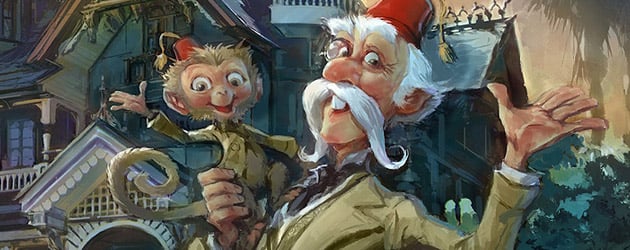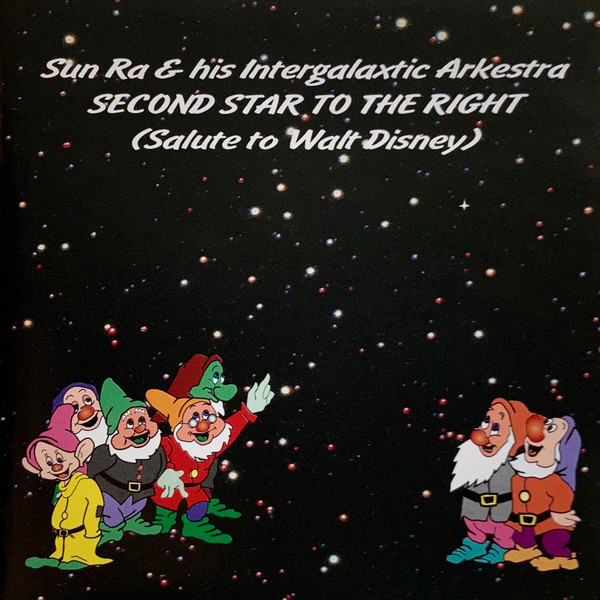Album: Second Star to the Right (Salute to Walt Disney)
Artist: Sun Ra & His Intergalaxtic Arkestra
Label: Leo Records
Year Released: 1995
In the long history of jazz music, there’s never been another musician quite like Sun Ra. His biography in the Alabama Music Hall of Fame refers to him as an “intergalactic traveler, translator of myths, poet, composer, and visionary…” as well as an “innovator in Jazz.” It’s a description that seems understated when you get to know his life story.
Born Herman Pool Blount, he was nicknamed “Sonny” at a young age. He began composing music by age 11 or 12. According to stories, he had a virtuosic musical ability and mind, with some stating that as a teenager he could attend a big band concert and make a complete transcript of the music from memory.
By the time he was 20, he’d begun touring with Ethel Harper’s band, taking over leadership when she ultimately departed. The group toured for a short time as the Sonny Blount Orchestra before breaking up. A few years later, he would have an experience that would change the course of his life.
As he related it in later years, he was taken on a trip to the planet Saturn. He stated, “My whole body changed into something else. I could see through myself. And I went up… I wasn’t in human form… I landed on a planet that I identified as Saturn… they teleported me and I was down on [a] stage with them. They wanted to talk with me. They had one little antenna on each ear. A little antenna over each eye. They talked to me. They told me to stop [attending college] because there was going to be great trouble in schools… the world was going into complete chaos… I would speak [through music], and the world would listen. That’s what they told me.”
After moving to Chicago, he began working with composer Fletcher Henderson, and later with saxophonist Coleman Hawkins. It was during his time with Henderson that he began working as an arranger, and decided to put together a band to play his personal arrangements. The band began recording under the El Saturn label, which he’d formed with Alton and Artis Abraham in 1957. By this time, he’d taken on the name Le Sony’r Ra as a rejection of what he viewed as a slave name.
It was during his time in Chicago that he became exposed to groups such as the Black Muslims and books like George G.M. James’s Stolen Legacy which posited that Greek mythology had its roots in Egypt. These Afrocentric ideas would begin to pervade his music and work, as did the influence of science fiction that would lead to his status as a pioneer of Afrofuturism, which is defined as, “a movement in literature, music, art, etc., featuring futuristic or science fiction themes which incorporate elements of Black history and culture.”
He began using the liner notes of his albums to outline what he referred to as an “Astro-Black mythology” that aligned ancient Egyptian history with a cosmic future. As he saw it, life in the world had become untenable and the new “myths” he was creating were meant to guide humanity toward a better future in outer space. He stated, “The impossible attracts me because everything possible has been done and the world didn’t change.”
Aside from his cosmic philosophy, or more accurately because of it, his music became part of jazz’s avant-garde that emerged in the 50s and 60s. He became one of the first jazz musicians to use instruments like electronic keyboards and synthesizers, and dubbed other instruments with new names such as the “space dimension mellophone.” His group was known as the Sun Ra Arkestra, and they established a communal home in New York, where they made a splash because of their colorful and generally outlandish attire. Rather than musicians, members of the Arkestra were known as “tone scientists.”
As improbable as it seems, Ra also developed a deep admiration for the films of Walt Disney, which would eventually lead to the album Second Star to the Right (Salute to Walt Disney). A 1989 article in the Washington Post, notes that Sun Ra was performing the music of Walt Disney at shows. The band was even known to wear Mouseketeer ears during performances and even had someone show up dressed as Dumbo. As the article states, “Walt Disney and Sun Ra are two of the 20th century’s master fantasists: One asked us to wish upon a star; the other asked us to believe he was born on one. These two manipulators of the imagination finally confronted each other when the avant-garde band leader played a show of songs from the producer’s movies at the 9:30 club Wednesday night.”
That same year, Sun Ra & His Intergalaxtic Arkestra would perform at Jazzatelier Ulrichsberg in Austria. During the show, they performed songs like “The Forest of No Return,” from Babes in Toyland, “I’m Wishing” from Snow White and the Seven Dwarfs, and “Second Star to the Right” from Peter Pan. The show was recorded, but would not be released as an album for another six years.
The songs are recognizable, though they frequently drift into what The New Yorker referred to as “anarchic, noisy space music.” Tracks like “Someday My Prince Will Come” begin with delicate piano that follows the traditional melody, before drifting into a screeching, occasionally atonal, saxophone solo. The vocals, specifically those of James Jacson, sound like a more grizzled version of Louis Armstrong, while the group’s interpretation of “Second Star to the Right” sounds like an intoxicated second-line brass band performing at a jazz funeral.
Your enjoyment of the album will largely depend on your propensity for freeform and experimental jazz, but for those who enjoy it, there are treasures to be found on the disc.
Suggested Listening:
Song: Door of the Cosmos
Artist: Sun Ra and His Intergalactic Myth Science Solar Arkestra
Label: El Saturn
Year Released: 1979
Song: Jupiter
Artist: John Coltrane
Label: Impulse!
Year Released: 1974
Song: All My Life
Artist: Ornette Coleman
Label: Columbia Year Released: 1972









